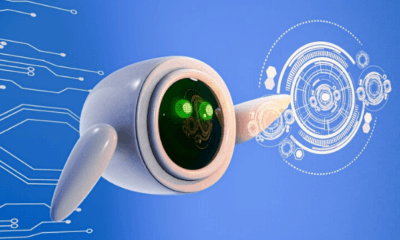AI
AI Regulation Impact Assessment PDF: A Comprehensive Guide
Greetings, dear readers! Hope you are happy and ready to embark on an insightful journey into the world of AI regulation. In this comprehensive guide, we will delve into the intricacies of the AI Regulation Impact Assessment PDF, unraveling its significance and implications. As we navigate through the complexities of this ever-evolving field, we will shed light on the crucial role of AI in shaping our future. So, without further ado, please continue reading to discover the profound impact of AI regulation and its implications for our society.
Impact Assessment Framework
The Impact Assessment Framework provides a structured approach to evaluate the effects of a project, policy, or program on various aspects of society and the environment.
It aims to measure both intended and unintended consequences, fostering informed decision-making. How does the framework account for long-term impacts?
By considering the long-term effects on different stakeholders and the environment. What are the key steps in implementing the framework? The key steps include scoping, identifying impacts, predicting and evaluating impacts, and developing mitigation measures.
Visit our main page Tecmenu.com
Key Components of AI Regulation
The key components of AI regulation are crucial for ensuring the ethical and responsible development of artificial intelligence. First, transparency is essential, requiring developers to disclose the algorithms and data used in AI systems.
Second, accountability is necessary, holding developers responsible for any harm caused by their AI systems. Third, privacy protection is vital, safeguarding individuals’ personal data from misuse.
Fourth, fairness must be upheld, preventing bias and discrimination in AI systems. Fifth, robust cybersecurity measures are imperative to protect against potential threats.
Lastly, continuous monitoring and evaluation are needed to ensure compliance with regulations and address any emerging risks. These components form the foundation for effective AI regulation.
Legal and Ethical Considerations
Legal and Ethical Considerations are crucial factors in any decision-making process. It’s important to understand the laws and regulations that govern a particular industry or activity, as well as the ethical implications of one’s actions.
By considering the legal and ethical aspects of a situation, individuals and organizations can ensure that they are operating within the boundaries of the law and upholding moral standards.
Frequently Asked Questions (FAQ): What legal requirements do I need to consider before starting a new business? How can I ensure that my company operates ethically and responsibly?
What are the consequences of disregarding legal and ethical considerations in business?
Data Privacy and Security
Data Privacy and Security are vital aspects of our digital lives. How can we protect our personal information from cyber threats? What measures can individuals take to safeguard their online privacy?
How can businesses ensure the security of customer data?
Transparency in AI Systems
Transparency in AI Systems:Artificial Intelligence (AI) systems have become an integral part of our lives, impacting various aspects of society. As these systems continue to evolve, it is crucial to prioritize transparency to ensure their responsible and ethical use.
Transparency in AI refers to the clear understanding of how these systems work, the data they use, and the decision-making processes they employ.Firstly, transparency in AI systems allows for accountability.
When the inner workings of AI systems are transparent, it becomes easier to identify and address biases, errors, and potential ethical concerns. By shedding light on the decision-making process, transparency helps to hold AI systems accountable for their actions, promoting fairness and reducing the risk of unintended consequences.
Secondly, transparency fosters trust. When users and stakeholders have a clear understanding of how AI systems operate, they are more likely to trust the technology.
Transparency builds confidence in the fairness and reliability of AI systems, which is crucial for their widespread adoption in various domains, such as healthcare, finance, and autonomous vehicles.
Lastly, transparency enables informed decision-making. When individuals have access to information about how AI systems work, they can make informed choices about whether to trust and engage with these systems.
Transparent AI systems empower users to understand the limitations, biases, and potential risks associated with the technology, allowing them to make decisions that align with their values and preferences.
In conclusion, transparency in AI systems plays a vital role in ensuring accountability, fostering trust, and enabling informed decision-making. By promoting transparency, we can build more responsible and ethical AI systems that benefit society as a whole.
Bias and Fairness in AI
Bias and Fairness in AI is a complex and critical issue that affects our society on multiple levels. The development and deployment of artificial intelligence systems have the potential to greatly impact various aspects of our lives, from employment opportunities to criminal justice.
However, these systems are not immune to biases, as they are often trained on data that reflects existing societal biases. This can lead to unfair outcomes and perpetuate discrimination.
For example, facial recognition algorithms have been shown to have higher error rates for people with darker skin tones, leading to potential misidentification and unfair treatment.
Addressing bias in AI requires a multi-faceted approach. It involves diverse and inclusive datasets that accurately represent the population, as well as robust evaluation metrics to measure fairness.
Additionally, AI developers must be mindful of the potential biases that can arise during the design and training phases of the system.To achieve fairness in AI, we must also consider the ethical and legal implications.
Regulations and guidelines need to be put in place to ensure that AI systems are developed and deployed in a manner that respects human rights and avoids discrimination.
This includes monitoring and auditing AI systems to detect and mitigate bias.In conclusion, bias and fairness in AI is a crucial issue that requires attention from all stakeholders.
By acknowledging and addressing biases, we can strive for a future where AI systems are fair, transparent, and equitable, benefiting society as a whole.
Accountability and Responsibility
Accountability and Responsibility are two fundamental concepts that play a crucial role in personal and professional development. Understanding these concepts is essential for achieving success and maintaining healthy relationships.
Here are three clear and concise explanations to shed light on these concepts.1. Accountability refers to the obligation and willingness to take ownership of one’s actions, decisions, and their consequences.
It means being answerable for the outcomes and taking responsibility for both successes and failures. Accountability fosters trust, promotes growth, and enables individuals to learn from their experiences.
2. Responsibility is the ability to fulfill obligations and duties assigned to us. It involves being reliable, dependable, and trustworthy in carrying out tasks and meeting expectations.
Responsibility requires understanding the impact of our actions on others and taking necessary steps to address any consequences. It is a key trait of ethical behavior and contributes to personal and professional integrity.
3. Accountability and Responsibility are closely linked, as they complement each other in creating a strong foundation for individual and collective progress.
Accountability without responsibility can lead to blame-shifting and lack of commitment, while responsibility without accountability may result in a lack of transparency and disregard for the impact of one’s actions.
When combined, accountability and responsibility promote a culture of trust, cooperation, and continuous improvement.In conclusion, accountability involves taking ownership of one’s actions and their outcomes, while responsibility entails fulfilling obligations and being reliable.
Together, they form the basis for personal growth, effective teamwork, and ethical behavior. By embracing these concepts, individuals can cultivate a sense of self-awareness, integrity, and contribute positively to their communities.
Sayings Before You Go
In conclusion, the AI Regulation Impact Assessment PDF: A Comprehensive Guide provides valuable insights into the impact of AI regulation and the importance of conducting thorough assessments.
It highlights the need for policymakers, businesses, and individuals to understand the potential risks and benefits associated with AI technologies. As we navigate the complex landscape of AI regulation, it is crucial to stay informed and proactive.
So, goodbye to another interesting article, and don’t forget to share this comprehensive guide with your friends. Together, let’s embrace the power of AI responsibly.
Thank you.FAQ (Frequently Asked Questions):1. What is AI regulation?2. Why is AI regulation important?3. How does AI regulation impact businesses?4. What are the potential risks of AI technologies?
5. How can individuals contribute to AI regulation?6. Are there any international standards for AI regulation?7. How can I stay informed about AI regulation updates?
8. What are the key considerations for conducting an AI impact assessment?9. How can AI regulation foster innovation while protecting privacy and security?
10. What role do policymakers play in shaping AI regulation?
About The Author
AI
Artificial Intelligence Debate: Exploring the Pros and Cons for Society

Businessreign.com – Artificial intelligence (AI) has revolutionized various aspects of our lives, from the smartphones we carry to the cars we drive. While AI has undoubtedly brought about significant advancements, it has also sparked a heated debate about its overall impact on humanity.
The Benefits of Artificial Intelligence
Proponents of AI highlight numerous advantages that this technology offers to society. These include:
- Enhanced Efficiency and Productivity: AI automates repetitive tasks, freeing up human workers to focus on more complex and creative endeavors. This automation streamlines processes, increases output, and reduces costs across various sectors.
- Improved Decision-Making: AI algorithms can analyze vast amounts of data to identify patterns, trends, and anomalies that humans might miss. This capability enables better-informed decisions in areas such as healthcare, finance, and risk assessment.
- Personalized Experiences: AI tailors products, services, and content to individual preferences and needs. This personalization enhances user experiences, improves customer satisfaction, and drives engagement.
- Advanced Scientific Research: AI accelerates scientific breakthroughs by analyzing complex data, generating hypotheses, and conducting simulations. This contribution drives progress in fields like medicine, materials science, and environmental research.
The Concerns Surrounding Artificial Intelligence
Despite its undeniable benefits, AI raises concerns that have fueled a debate about its overall impact on society. These concerns include:
- Job Displacement: AI automation raises fears of widespread job losses, particularly in industries reliant on repetitive tasks. This displacement could lead to economic hardship and social unrest.
- Algorithmic Bias: AI algorithms can perpetuate existing biases in the data they are trained on. This bias can lead to discriminatory outcomes in areas like hiring, loan applications, and criminal justice.
- Privacy and Security Risks: AI systems collect and analyze vast amounts of personal data, raising concerns about privacy breaches and misuse of information. This data can be exploited for surveillance, manipulation, and identity theft.
- Loss of Control and Ethical Dilemmas: The increasing sophistication of AI raises concerns about human control over these systems. Ethical dilemmas arise when AI makes decisions that have significant consequences for individuals and society.
Navigating the Future of AI
As AI continues to evolve, it is crucial to address both its potential benefits and its associated risks. Governments, businesses, and individuals must collaborate to ensure that AI is developed and used responsibly, ethically, and for the betterment of society.
Conclusion
AI is a powerful tool that has the potential to transform our world for the better. However, it is essential to approach AI with caution and foresight, ensuring that its development and application align with human values and societal well-being. By carefully navigating the pros and cons of AI, we can harness its power to create a future that benefits all of humanity
About The Author
AI
The Double-Edged Sword: Exploring the Pros and Cons of Artificial Intelligence

Businessreign.com – Artificial intelligence (AI) has permeated nearly every aspect of our lives, from the smartphones we carry to the cars we drive. While AI has undoubtedly brought about significant advancements, it has also sparked a heated debate about its overall impact on humanity.
The Benefits of Artificial Intelligence
Proponents of AI highlight numerous advantages that this technology offers to society. These include:
- Enhanced Efficiency and Productivity: AI automates repetitive tasks, freeing up human workers to focus on more complex and creative endeavors. This automation streamlines processes, increases output, and reduces costs across various sectors.
- Improved Decision-Making: AI algorithms can analyze vast amounts of data to identify patterns, trends, and anomalies that humans might miss. This capability enables better-informed decisions in areas such as healthcare, finance, and risk assessment.
- Personalized Experiences: AI tailors products, services, and content to individual preferences and needs. This personalization enhances user experiences, improves customer satisfaction, and drives engagement.
- Advanced Scientific Research: AI accelerates scientific breakthroughs by analyzing complex data, generating hypotheses, and conducting simulations. This contribution drives progress in fields like medicine, materials science, and environmental research.
The Concerns Surrounding Artificial Intelligence
Despite its undeniable benefits, AI raises concerns that have fueled a debate about its overall impact on society. These concerns include:
- Job Displacement: AI automation raises fears of widespread job losses, particularly in industries reliant on repetitive tasks. This displacement could lead to economic hardship and social unrest.
- Algorithmic Bias: AI algorithms can perpetuate existing biases in the data they are trained on. This bias can lead to discriminatory outcomes in areas like hiring, loan applications, and criminal justice.
- Privacy and Security Risks: AI systems collect and analyze vast amounts of personal data, raising concerns about privacy breaches and misuse of information. This data can be exploited for surveillance, manipulation, and identity theft.
- Loss of Control and Ethical Dilemmas: The increasing sophistication of AI raises concerns about human control over these systems. Ethical dilemmas arise when AI makes decisions that have significant consequences for individuals and society.
Navigating the Future of AI
As AI continues to evolve, it is crucial to address both its potential benefits and its associated risks. Governments, businesses, and individuals must collaborate to ensure that AI is developed and used responsibly, ethically, and for the betterment of society.
Conclusion
AI is a powerful tool that has the potential to transform our world for the better. However, it is essential to approach AI with caution and foresight, ensuring that its development and application align with human values and societal well-being. By carefully navigating the pros and cons of AI, we can harness its power to create a future that benefits all of humanity.
About The Author
AI
Artificial Intelligence Debate: Exploring the Pros and Cons for Society

Businessreign.com – Artificial intelligence (AI) has permeated nearly every aspect of our lives, from the smartphones we carry to the cars we drive. While AI has undoubtedly brought about significant advancements, it has also sparked a heated debate about its overall impact on humanity.
The Benefits of Artificial Intelligence
Proponents of AI highlight numerous advantages that this technology offers to society. These include:
- Enhanced Efficiency and Productivity: AI automates repetitive tasks, freeing up human workers to focus on more complex and creative endeavors. This automation streamlines processes, increases output, and reduces costs across various sectors.
- Improved Decision-Making: AI algorithms can analyze vast amounts of data to identify patterns, trends, and anomalies that humans might miss. This capability enables better-informed decisions in areas such as healthcare, finance, and risk assessment.
- Personalized Experiences: AI tailors products, services, and content to individual preferences and needs. This personalization enhances user experiences, improves customer satisfaction, and drives engagement.
- Advanced Scientific Research: AI accelerates scientific breakthroughs by analyzing complex data, generating hypotheses, and conducting simulations. This contribution drives progress in fields like medicine, materials science, and environmental research.
The Concerns Surrounding Artificial Intelligence
Despite its undeniable benefits, AI raises concerns that have fueled a debate about its overall impact on society. These concerns include:
- Job Displacement: AI automation raises fears of widespread job losses, particularly in industries reliant on repetitive tasks. This displacement could lead to economic hardship and social unrest.
- Algorithmic Bias: AI algorithms can perpetuate existing biases in the data they are trained on. This bias can lead to discriminatory outcomes in areas like hiring, loan applications, and criminal justice.
- Privacy and Security Risks: AI systems collect and analyze vast amounts of personal data, raising concerns about privacy breaches and misuse of information. This data can be exploited for surveillance, manipulation, and identity theft.
- Loss of Control and Ethical Dilemmas: The increasing sophistication of AI raises concerns about human control over these systems. Ethical dilemmas arise when AI makes decisions that have significant consequences for individuals and society.
Navigating the Future of AI
As AI continues to evolve, it is crucial to address both its potential benefits and its associated risks. Governments, businesses, and individuals must collaborate to ensure that AI is developed and used responsibly, ethically, and for the betterment of society.
Conclusion
AI is a powerful tool that has the potential to transform our world for the better. However, it is essential to approach AI with caution and foresight, ensuring that its development and application align with human values and societal well-being. By carefully navigating the pros and cons of AI, we can harness its power to create a future that benefits all of humanity.
About The Author

 Business9 months ago
Business9 months agoMaster Business Planning: Essential Guide for Aspiring Entrepreneurs

 Business9 months ago
Business9 months agoBusiness Innovation: Top Idea Generation Techniques for Entrepreneurs

 tech11 months ago
tech11 months agoNvidia Neuromorphic Chip: Advancing AI Technology

 Business9 months ago
Business9 months agoOldest private members’ clubs London: Historical Gems
- AI9 months ago
Should AI Be Banned: Pros, Cons, and the Future of Education

 Business9 months ago
Business9 months agoFamous private clubs in London: Renowned Establishments

 Artificial Intelligence9 months ago
Artificial Intelligence9 months agoArtificial Intelligence Is a Threat to Humanity: Debate Points
- Business11 months ago
John Lewis CEO: Leadership and Strategy (Who is the Current CEO? also works)

